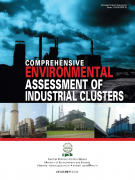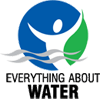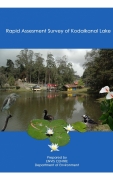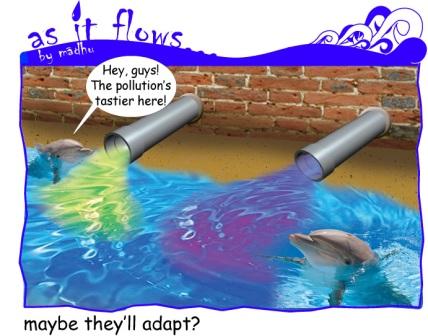/topics/biological-pollution
Biological Pollution
Water for All - An educational booklet by Utthan
Posted on 25 Aug, 2010 10:32 AMThis document is an educational booklet on water management, published by Utthan, which works towards empowering women's groups to seek clean and adequate quality of water for all.
The booklet provides background information on water as an important natural resource and the importance of protecting and maintaining the quality and quantity of this natural resource.
The details have been explained in a manner that is simple and understandable and include illustrations that are self explanatory and easy to follow.
The booklet is divided into the following sections:
48% industrial clusters in India are critically polluted: CPCB
Posted on 10 Aug, 2010 11:38 PM A Comprehensive Environmental Pollution Index (CEPI) is a very useful tool to capture the health dimensions of the environment including air, water and land. The CEPI is intended to act as an early warning tool and can help in categorising the industrial clusters/areas in terms of priority of planning needs for interventions.
A Comprehensive Environmental Pollution Index (CEPI) is a very useful tool to capture the health dimensions of the environment including air, water and land. The CEPI is intended to act as an early warning tool and can help in categorising the industrial clusters/areas in terms of priority of planning needs for interventions.
This report by the Central Pollution and Control Board (CPCB) presents the results of the application of the CEPI to selected industrial clusters or areas.
The main objective of the study was to identify polluted industrial clusters or areas in order to take concerted action and to centrally monitor them at the national level. This was in order to improve the current status of environmental components such as air and water quality data, ecological damage, and visual environmental conditions.
Invitation for case study submission in water magazine
Posted on 06 Aug, 2010 11:26 AM
Our publication is coming up with the annual "Case Study Special Issue” in Sept. 2010. Its a collector’s issue, where we are covering leading industries across the globe.
Rapid assessment survey of Kodaikanal lake - ENVIS Centre (TN) (2009)
Posted on 02 Aug, 2010 02:02 AM This document by the Department of Environment, Government of Tamil Nadu highlights the importance of the Kodaikanal lake as an important tourist destination and warns that this freshwater lake is under the threat of getting polluted and its biodiversity endangered.
This document by the Department of Environment, Government of Tamil Nadu highlights the importance of the Kodaikanal lake as an important tourist destination and warns that this freshwater lake is under the threat of getting polluted and its biodiversity endangered.
The document presents the findings of the study that aimed at assessing the physico-chemical and biological quality of the Kodaikanal lake.
Evidence indicates that unrestricted tourism activities have led to high use of plastic bottles, glass bottles, plastic bags, causing high levels of pollution and silting of the lake. Damaged fibreglass boats left inside the lakes also pose a serious threat to the lake ecosystem.
Dr. G. D. Agrawal , the scientist, environmentalist and rishi
Posted on 27 Jul, 2010 03:52 PMDr. G. D. Agrawal Scientist and Rishi
Meeting Dr. G. D. Agrawal in his spartan, two room cottage in Chitrakoot, Madhya Pradesh, you would never guess what an accomplished and distinguished scientist he is – first Member-Secretary of the Government of India’s Central Pollution Control Board, former Head of the Department of Civil and Environmental Engineering at IIT Kanpur and a PhD from the University of California, Berkeley. The list goes on and on.
Yet this eminent professional sweeps his own floors, washes his own clothes and cooks his own meals. He retains only a few possessions and dresses in homespun khadi. At the age of 76, his main mode of transport within Chitrakoot is a bicycle and when he travels further afield, he goes by ordinary bus and second-class train. These are the deliberate choices of a devout Hindu whose deepest values are for simplicity and reverence for nature. Dr G.D. Agrawal is the doyen of environmental engineering professionals in India. Well past retirement, he continues to teach and inspire students as an Honorary Professor of Environmental Sciences at the Mahatma Gandhi Chitrakoot Gramodaya Vishwavidyalaya, in Chitrakoot (M.P.).
Environment flows - Continuing the discussion
Posted on 21 Jul, 2010 12:41 AM
Workshop on pollution abatement in Ganga basin - Need for effective waste water management
Posted on 28 Dec, 2009 05:08 PMKanpur, November 24, 2009: Shri Alok Ranjan, IAS, Principal Secretary, UP Urban Development and Environment, inaugurated the workshop organized by WWF India, Kanpur Nagar Nigam and IIT Kanpur.
Status of groundwater quality in Bangalore: Conducted by the Department of Mines and Geology, Government of Karnataka
Posted on 14 Aug, 2009 01:47 PMThe study collected 918 samples from 735 locations across an area of 400 square kilometers of the city and its environs. The samples were collected in March and April of 2003. Testing was done for 25 parameters. The results indicate that -
Bacteriological quality of water samples of a tertiary care medical center campus in North Western Himalayan region
Posted on 14 Aug, 2009 11:53 AMA study published in the The Internet Journal of Third World Medicine of bacteriological quality of water samples of a tertiary care medical center campus in North Western Himalayan region, more specifically in Kangra district of Himachal Prad
Longitudinal bacteriological study of drinking water quality in rural western Maharashtra and its effects on changes in local drinking water management practices
Posted on 13 Aug, 2009 12:51 PMThis longitudinal study was undertaken by The Foundation for Medical Research and The Foundation for Research in Community Health in the Parinche valley in Purandar block (Pune district) of interior Western Maharashtra with the aim of testing bacteriological quality of rural water supplies.





